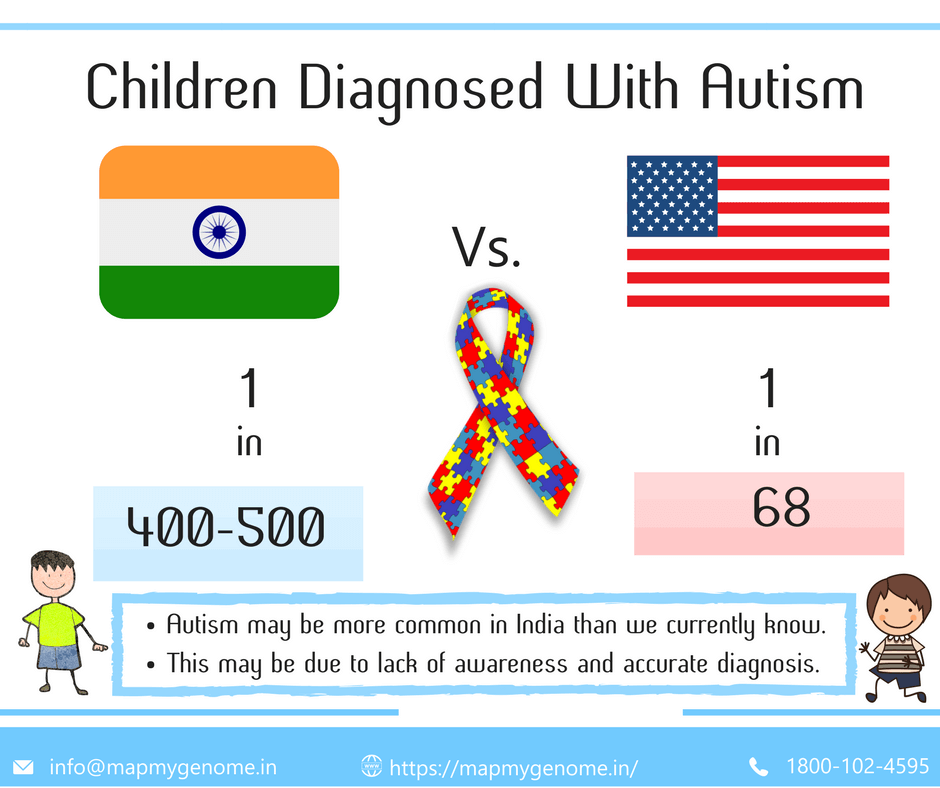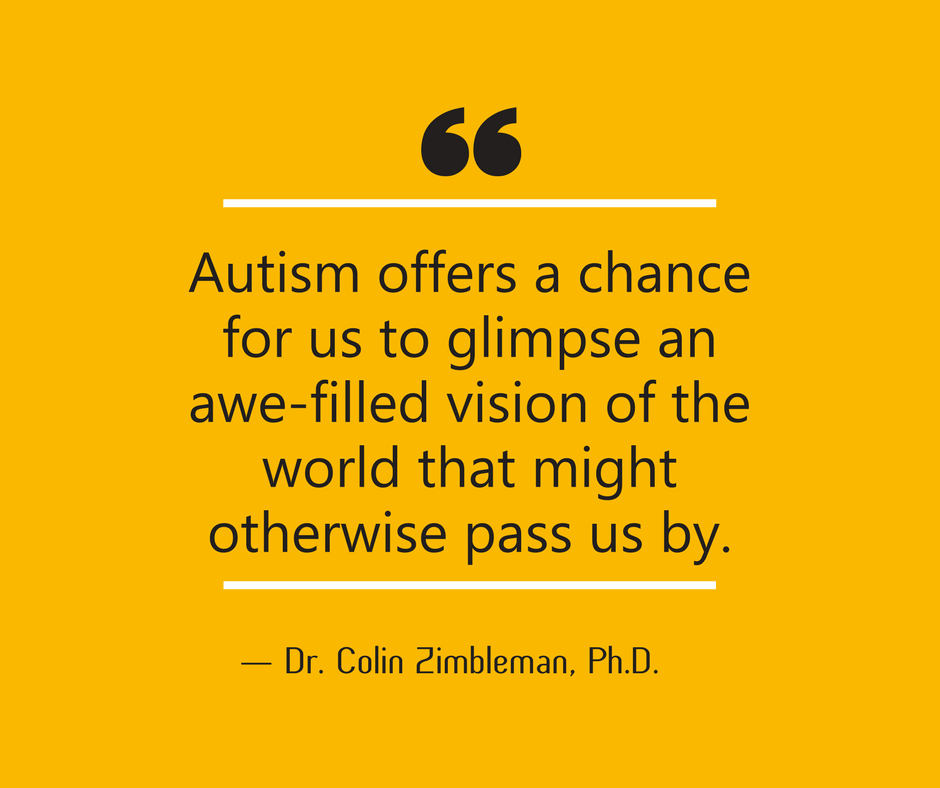Autism Awareness: Let's Color The World Blue!
Apr 02, 2018
6274 Views
April 2nd is World Autism Awareness Day. We are celebrating Autism Spectrum Disorder this month by sharing information with you and of course, lighting up the world blue!
What are Autism Spectrum Disorders?
Autism or Autism Spectrum Disorders (ASD) refers to a group of conditions characterized by challenges with social behavior, repetitive behavior and speech. Some individuals may present with unique skills and strengths. Individuals diagnosed with Autism Spectrum Disorders present with wide range of severity. In the last decade, the incidence of autism seems to be on the rise; this may be attributed to increased awareness among both families and professionals leading to earlier and accurate diagnosis.

What are the most common symptoms of ASD?
Children commonly develop ASD before the age of 3 years. The three important behavioral symptoms include:
- Less social interaction. They may not feel the need to seek comfort. For example, children may not feel the need to be cuddled or picked up. They may have less interaction with other children or adults.
- Lack of communication. Children with ASD tend to avoid eye contact. They may not be involved in typical pretend play wherein children role-play various activities (such as playing with a doll or pretending to cook). Some children may not make friends as easily as their peers may.
- Repetitive behaviors. Toddlers present with repetitive movements such as twirling strings, flicking pages of books or licking. Whole body movements include spinning, rocking, and running back and forth.
Many children often come to medical attention during the second year of their life due to language delays, which may become more obvious. Children may also show other behavioral symptoms such as meltdowns, which may be caused due to change in routine, or hypersensitivity to sounds or stimuli.
Is Autism Spectrum Disorder genetic?
A genetic cause can be identified for about 30–40% of children diagnosed with autism. For the remaining 60–70% cases, genetic causes remain unknown. In cases of syndromic autism, in addition to being diagnosed with autism, children may present with unique features (e.g., skin pigmentation, large head size) or congenital birth defects (e.g., heart defects or changes in food pipe) requiring surgeries. On the other hand, in cases of non-syndromic autism, children typically do not have additional unique features or congenital birth defects. There is a higher chance of identifying an underlying genetic cause for an individual diagnosed with syndromic autism.
There are several distinct genetic changes known to be associated with ASD.
- ASD could be a part of several specific genetic syndromes. For instance, 1–3% children with autism are diagnosed with Fragile X syndrome, which is caused due to expansion of genetic material in the FMR1 gene. Other common genetic syndromes in which children present with ASD include 22q11.2 deletion or Digeorge syndrome, Down syndrome and Rett syndrome.
Table 1. Prevalence of ASD in children diagnosed with specific genetic syndromes (Richards C et. al, 2015)
| Genetic condition | Prevalence of ASD |
| Fragile X syndrome | 21–50% |
| Cornelia de Lang syndrome | 43% |
| CHARGE syndrome | 30% |
| Tuberous Sclerosis Complex | 36% |
| Down Syndrome | 16% |
| 22q11.2 deletion syndrome or DiGeorge syndrome | 11% |
- Some individuals may carry disease-causing changes (mutations) in single genes that can cause autism, such as changes in a gene called PTEN, which causes a group of disorders known as PTEN hamartoma tumor syndrome.
- Many chromosomal abnormalities (deletion or addition of genetic material) have been identified as a genetic cause for autism (e.g., changes in chromosome 16, specifically at location 16p11.2). Such genetic changes may be inherited from a parent or could be acquired as a new genetic change that occurred during fetal development.
Advances in genetic testing technology have successfully identified underlying genetic causes of autism for many individuals. A genetic diagnosis can have several benefits including:
- Appropriate medical management for children with ASD
- Accurately predict the risk of genetic conditions in future pregnancies
- Availability of prenatal and preimplantation genetic diagnosis when we have identified the cause of autism in the family
Myths and Misconceptions
As genetic counselors, we come across many myths and misconceptions associated with ASD. Let’s address some of these common myths we have learnt about from our patients over the years.
Vaccination causes Autism
No! Vaccination DOES NOT cause autism. Scientific studies that claimed vaccination causes autism were flawed and, thus, appropriately disregarded.
Stepping out during solar or lunar eclipses causes Autism
This is not true. In India, a common cultural myth is that if a pregnant woman steps out during an eclipse there may be an increased risk for autism or birth defects in the baby. There is no scientific evidence to show that eclipses can increase risk for birth defects or autism. While there is no risk to the pregnancy, stepping out during a solar eclipse to enjoy the celestial occurrence without any eye protection can cause vision damage due to radiation exposure!
Stem cell therapy can cure autism
There is no scientific evidence to prove that stem cell therapy can cure autism. Stem cell companies may claim that stem cell therapy can cure autism; however, this claim is not supported by scientific data. In addition, stem cell storage companies could potentially have a conflict of interest in providing such services as it allows them to advance their research on stem cell.
There are no genetic causes for autism
An underlying genetic cause for autism can be identified in about 30–40% individuals diagnosed with autism. ASD can often be a part of a genetic syndrome. As research and genetic testing technology advances further, newer genetic causes for autism may be identified in the future.
Special diets can cure autism
There is insufficient data to prove that casein-free and gluten-free diet can cure ASD. Currently, there are ongoing clinical studies to better understand the risks and benefits of such dietary intervention.
Children with ASD will remain non-verbal
Not all children with ASD are non-verbal. In fact, studies show that 25% children who fit diagnostic criteria for ASD at the age of 2 or 3 years begin to talk and communicate by the age of 6 or 7 years (Miles JH, 2011). Children with speech delays will require additional support including speech therapy and support from school systems.
Children with ASD cannot be a part of mainstream society
While some children with ASD will continue to require long-term support from healthcare professions, parents and society, this is not true for all children with ASD. Many children with ASD attend regular school, interact with their peers and continue to be integrated in the ‘mainstream’ society. Thanks to increasing support and awareness, many individuals diagnosed with high-functioning autism have been able to go to universities and even hold jobs.
Children with ASD will always have intellectual disability
Not all children with ASD have intellectual disability or mental retardation. Children diagnosed with ASD present with varying degrees of IQ. In some cases, children may present with learning disability or some level of intellectual disability requiring additional support.

Mapmygenome Can Help You
If your child has a diagnosis of autism, speaking with a genetic counselor can help you to better understand possible underlying genetic causes of autism and discuss emotional and medical implications for yourself and your family members. A genetic counselor is a specialized health care professional who has expertise in medical genetics and psychological counseling.
If you would like to set up a genetic counseling appointment CALL US on 1800 102 4595 (toll-free) or 040-66986700 or WRITE TO US at info@mapmygenome.in
References
- Miles JH Autism Spectrum Disorders- A genetics review. Genet Med. 2011 Apr;13(4):278-94.
- Richards, C., Jones, C., Groves, L., Moss, J. & Oliver, C. (2015). Prevalence of Autism Spectrum Disorder Phenomenology in Genetic Disorders: A Systematic Review and Meta- Analysis. The Lancet Psychiatry, 2, 909-916.
